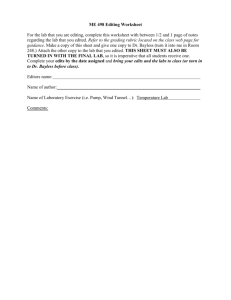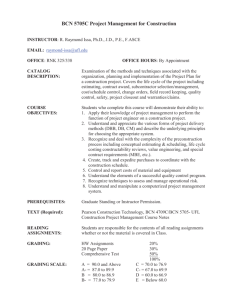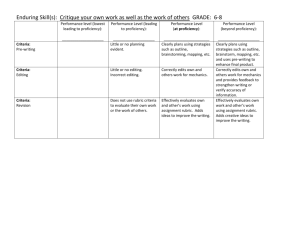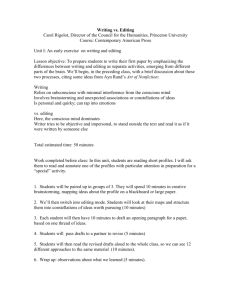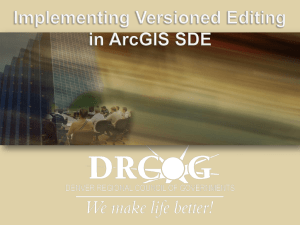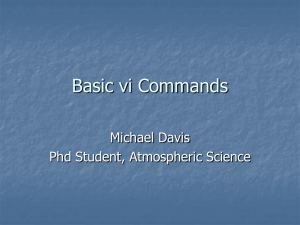townhall-march-2013
advertisement
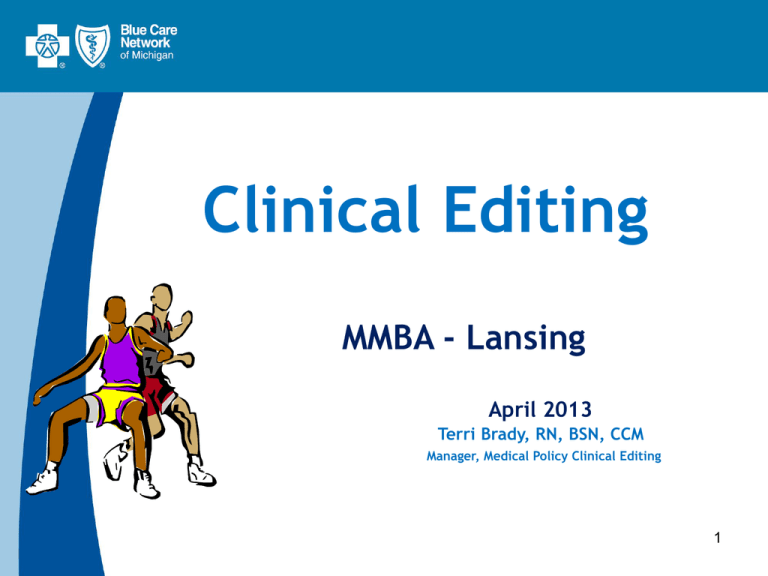
Clinical Editing MMBA - Lansing April 2013 Terri Brady, RN, BSN, CCM Manager, Medical Policy Clinical Editing 1 Clinical Editing Team • Supervisor – Tracy Bunge – 4 Clinical editing analysts • Lead analyst – System configuration 2 Clinical editing overview BCN is focused on accurate and fair payment to providers for the covered services they provide: The proper reporting of clinical services presents challenges due to the significant volume and complexity of codes, modifiers and combinations that are used to define correct coding. Effective clinical editing management is required to assure proper payment is made. The challenges that apply to proper reporting also apply to clinical editing. The largest national carriers contract with external vendors for clinical editing expertise. 3 Clinical editing overview From Claims chapter of BCN Provider Manual 4 Clinical editing overview From Claims chapter of BCN Provider Manual 5 Clinical editing appeals: The basics Clinical Editing 101 Appeals are processed in Grand Rapids and Southfield by trained analysts. Appeals are scanned into the system within one week. Our goal is to make a determination within 30 days and respond to the appeal within 40 to 50 days. If you have not received a determination in 30 days, please status your appeal with Customer Service before resubmitting. Currently, determinations are being made under 30 days, with responses sent within 30 days, in most cases. Our main focus is on correct coding. Not all clinical editing denials require an appeal. Submit appeals when appropriate. BCN does not use Clear Claim Connection (C3). Clinical editing denials are the provider’s liability; members are to be held harmless. 6 Clinical editing appeals: The basics Clinical Editing 101 (continued) Important things to know about the clinical editing appeals process: There is only one level of appeal. Appeals must: Be received within 180 days of the original denial. Submitted with a completed Clinical Editing Appeal Form. Submitted with appropriate clinical documentation. Include all other relevant documentation, if applicable. If further review is needed, the appeal will be sent to the medical director for determination. 7 Clinical editing appeals process From Claims chapter of BCN Provider Manual 8 Clinical editing appeals process From web-DENIS Billing page 9 Clinical editing appeals process From web-DENIS Billing page 10 Clinical editing appeals process From Claims chapter of BCN Provider Manual 11 Clinical editing denials From Claims chapter of BCN Provider Manual 12 Unbundling/rebundling From Claims chapter of BCN Provider Manual 13 Unbundling/rebundling Example of procedure unbundling / rebundling From BCN Provider News, Jan-Feb 2011 Note: *72192, 72193, 72194 and 74150, 74160, 74170 would be the individual component codes . 14 Unbundling/rebundling Example of procedure unbundling / rebundling (continued) • *11750 • *11752 • If these codes are reported on the same claim for the same toe or the same finger, pc 11750 would rebundle (or be considered incidental) to pc 11752. • If no modifiers are reported to distinguish separate sites an edit will occur, as same sites are assumed. 15 Incidental edits From Claims chapter of BCN Provider Manual 16 Incidental edits Example of incidental procedure • Examples: – *19102 – *19301 • If a breast biopsy is done at the same time as a mastectomy or a partial mastectomy, the biopsy will deny incidental to the mastectomy. • If the procedures were done on different breasts, the edit can be avoided by the use of a site modifier. 17 Repeat procedures Using modifiers for repeat procedures • Modifiers *76 and 77 are used to indicate repeat radiology, EKG or surgical pathology procedures. • Tips for using 76 and 77 include: Note: Modifier 77 usage has been expanded to include CPT code *59025. From Appropriate Modifier Usage document on webDENIS Billing page 18 Repeat procedures Using modifiers for repeat procedures (continued) • Modifiers *76 and 77 will not work in the two-view and three-views scenarios. These scenarios must be appealed. 19 Mutually exclusive edits From Claims chapter of BCN Provider Manual 20 Mutually exclusive edits Example of mutually exclusive codes • Examples: – *58152 – *58140 – Removal of fibroid tumors would be considered mutually exclusive when performed at the time of a hysterectomy. • An assumption is made when codes are submitted on a claim – same site and same session • Mutually exclusive edits consist of: – Procedure combinations that reach the same outcome, but typically via a different approach or technique – Overlapping services – Initial and subsequent services 21 Duplicate edits From Claims chapter of BCN Provider Manual 22 Duplicate edits Example of duplicate procedures • Example: BCN will pay for only one radiology report. The following example is for a patient receiving X-ray services during a surgical procedure: – If the orthopedic surgeon bills for professional radiology services rendered during the surgery, and the radiologist also reports for the same services, here’s what will happen: • The claim that is presented to BCN first will get paid. • The second claim will receive the edit. 23 Frequency edits Example of frequency edits • Example: a screening mammogram – A member’s benefits allow one for every 12 months. • Identified provider issue: verification of prior mammogram – Have member bring the prior report or film. – Contact the prior provider for the report. – Contact BCN Customer Service for the member’s last documented screening mammogram. • Screening and diagnostic mammograms can be done and reported on the same day, if medically indicated. • Diagnostic mammograms do NOT count against the frequency limit. 24 Procedure code/modifier edits From Claims chapter of BCN Provider Manual 25 Add-on code edits Add-on codes • Add-on codes must be reported with an appropriate primary procedure in order to be paid. • An add-on procedure should never be reported as a stand-alone service, and if done so, will most likely result in a clinical editing denial. • Add-on codes are not subject to multiplesurgery reduction, as this is taken into consideration in the code configuration. 26 Add-on code edits Add-on codes (continued) • Example: Billing with the add-on code *58110 (a biopsy code for a colposcopy) without billing an appropriate primary procedure code will result in a denial. • Many times there is more than one appropriate primary code. For PC *58110, the CPT manual indicates to code first *57420-57421, 5745257461). • To correct this type of clinical editing denial, submit a corrected claim or the Status Claim Review Form (available via the web-DENIS Billing page). 27 Modifier 59 usage Information on modifier *59 From BCN Provider News, Mar-Apr 2011 28 Modifier 59 usage Information on modifier *59 (continued) From BCN Provider News, Mar-Apr 2011 29 Modifier 59 usage From web-DENIS Billing page 30 Modifier 59 usage 31 Modifier 59 usage 32 Unlisted edits 33 Unlisted edits More about NOC codes From Care Management chapter of BCN Provider Manual 34 Unlisted edits NOC codes (continued) 35 Limit edits 36 Limit edits Example of limit rules • When a provider reports a number of units that exceeds the allowed number of units for that procedure, here’s what happens: – The total number of units is adjusted to the allowed amount assigned to that procedure. – The excess units are denied. 37 Limit edits Example of limit rules • For an injection into the eye, typically the procedure code of *67028 is reported: – The system is set up to allow a maximum of two injections – The limit is one per eye, RT and LT Note: Limits may also be applied to the drug(s) administered via the injection and are administered separately from the injection code(s), if applicable. Drug codes are not to be reported with site modifiers. 38 Investigational edits 39 Investigational edits Example of an investigational procedure • • • • *61640 *61641 *61642 BCN medical policy states: “The effectiveness of percutaneous transluminal angioplasty for the treatment of cerebral vasospasm following subarachnoid hemorrhage has not been established, therefore, it is considered experimental and investigational.” • Therefore, without prior authorization of an experimental/investigational procedure, it is not payable to providers and members are not responsible. Source: BCN medical policy Percutaneous Transluminal Angioplasty (PTA) for the Treatment of Cerebral Vasospasm effective 05/01/12. 40 Drug & biological edits • Implementation of Drugs & Biologicals editing began in April of 2010 • Edits are related to select drugs & biologicals; information has been published in the provider newsletter • Types of edits that may be seen with the d&b may vary with the agent, but may include the following: – – – – – – Diagnosis Dose interval Dose quantity Dose frequency Age Other 41 Drug & biological list - sample 42 Drug & biologicals: additional info • Drugs & Biological Editing J9300 is the procedure code for Gemtuzumab – PC J9300 will receive an edit when a diagnosis of acute myeloid leukemia is not reported on the claim for this injectable – PC J9300 will also receive an edit when it is reported more frequently than once every two weeks by any provider, regardless of the diagnosis • D & B Edits – Identified on remittance advice by an explanation code of QPB – QPL 43 Additional reasons for denials 44 Q&A QUESTION: How should an EMG be reported if it is done along with NCS? ANSWER: In 2012, the codes for EMGs were updated to include three add-on codes, *95886-95887. If NCS are done at the same time as an EMG, the appropriate add-on code should be reported, as opposed to a stand-alone EMG code (eg, 95860, 95861, 95870, etc.) 45 Q&A QUESTION: I am receiving a denial for the administration of drugs I get through the specialty pharmacy. This does not seem right. How can I get paid? ANSWER: The administration code for many drugs requires documentation as to which drug was provided. The solution, other than submitting an appeal, is to document the drug on the claim with the appropriate HCPCS code and a charge of $0.01. This will allow the drug to be recognized and the administration to go through and be paid. 46 Q&A QUESTION: Why do we have to appeal so much? ANSWER: BCN is focused on correct coding and documentation supporting the correct reporting of services provided. Appeals provide information that supports this effort and may result in the modification of clinical edits. A recent example of an edit modification is with PC 93306. This had been receiving an edit with E&M codes, especially noted in the IP setting. Upon review it was noted that the providers were typically performing the full study and doing a complete E&M. Therefore, it was determined to break this edit. NOTE: To facilitate the processing of appeals, please mark sections or comments specific to the procedure service being appealed. Highlighting may not work as it may obscure notes or become invisible as appeals are scanned. 47 Q&A QUESTION: What documentation do I need to submit for an appeal? ANSWER: It depends….on the service provided, the reason for the edit and what is being appealed. Typically for a an office visit – office visit notes are needed; for surgery – the operative report is a must; for radiology – the x-ray report is required. But, the reason for the denial must be considered in what documentation to send. For example, additional documentation may be required, including that of paid services, in many instances: •Duplicate denials, such as with radiology (both reports are needed) •Office visit/office procedures may require documentation of the procedures, not just the visit •Global edits may require the records from prior visits/services Documentation from the CPT book is not needed. Do not send copies of other payers or Medicare RAs or EOBs. If, though, you have information from professional societies or recent changes in Medicare payment rules (eg, transmittals), those may assist in the review. 48 Resources Links • • • Transmittals http://www.cms.hhs.gov/Transmittals/ NCDs http://www.cms.hhs.gov/mcd/index_list.asp?list_type=ncd LCDs http://www.cms.hhs.gov/DeterminationProcess/04_LCDs.asp Resources • BCN Provider Servicing: 1-866-299-4667 • BCN Clinical Editing – submit appeals to: Clinical Editing Appeals – Mail Code G820 Blue Care Network 611 Cascade West Parkway, SE – Grand Rapids, MI 49546-2143 49 50
